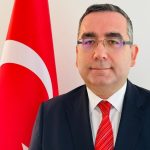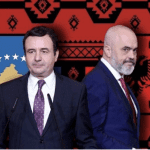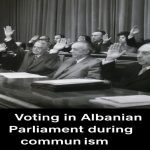Interviewed by Tirana Times’
ARDIT BEJKO
Dr. Bernd J. Fischer is a professor of History at Indiana University, Fort Wayne. His areas of expertise include Balkan history and politics, focusing on Albania and Yugoslavia in the XX century.
Fischer talks to Tirana Times about the latest developments in the region, and expresses his opinions on the Macedonian elections, the future of Kosovo and Serbia, and the status of Albanian politics.
What repercussions should we expect on Macedonia, after the elections? How will critical issues like the name issue, EU/NATO integration turn out?
I’m afraid the Macedonian elections reflect rather poorly on not only the Macedonian government but on ethnic Albanians in Macedonia, and Albanians everywhere. I thought the minister of the interior’s comment that she can not be held responsible for the actions of individual police was appalling, and an indication of just how dysfunctional the government there has become. In terms of the violence, I think the Albanian cause has been set back as a result, as has Macedonia’s quest to join NATO and the EU. Although the transition has been difficult, it still should not require nearly two decades before a fair and violence-free election can be held. I was in Macedonia several weeks ago and I must say I think the situation is very difficult. Rather than any real attempt at integration, what I saw was the creation of an apartheid situation. This is not healthy and could ultimately threaten the existence of the state.
While many in the west have a difficult time understanding the name issue, it is a symbol and we all know how important symbols are in the Balkans. But I do believe that both NATO and the EU are losing patience with Greece which I think should be more mature about this situation. The Macedonians, too, should be less provocative. They did not, for example, need to name the airport in Skopje after Alexander the Great. I believe that the principal force driving this dispute is domestic politics which makes compromise difficult. Still, I hope this issue will be resolved by compromise in the next months which, provided Macedonia can finally hold a decent election and doesn’t completely divide itself into two distinct separate communities, will allow it to continue on the road to NATO and the EU. While I think NATO admission should come relatively quickly, EU membership will of course take much longer.
Is Tadic’s victory in the last Serbian elections a step closer to EU integration?
In a way the Tadic victory is a step in the right direction – it does show that the extreme nationalists are losing some ground among the population as a whole. But there is a down side as well. The victory was not very convincing and has simply resulted in continuing political instability which may very well result in the necessity of new elections. I also appreciate the argument that if Nikolic had won he would by necessity have had to compromise his position to form a viable coalition government in order to deal with Serbia’s extensive problems. It is not too difficult to be the principled radical in opposition – it is almost impossible in this political climate to be one at the head of a coalition government. I think it is possible that the more radical aspects of his appeal would have faded much more rapidly had he won.
How will the elections affect the northern Kosovo partition issue?
I don’t think the Tadic victory will have a positive impact on the northern Kosovo issue. I believe that all major Serbian politicians are following more or less the same obstructionist policy in terms of Kosovo, based again principally on domestic political considerations. They hope the new state will fail and they intend to do everything in their power, short of war, to insure that result. The victims of the policy include Kosovar Serbs who are being used as pawns in a rather cynical game directed by Belgrade.
A month ago, Tomislav Nikolic, VP of the Serbian Radical Party, said there will be war if Kosovo joins Albania. What is your opinion on this statement? Is the unification a real threat?
I do not believe that the unification of Kosovo with Albania is a threat to anyone. However, I also do not believe that it will happen for a number of reasons. First, I don’t think many Albanians in Kosovo or Albania are in favor of unification. And as my friend Remzi Lani commented in March, you can’t have a greater Albania without the Albanians of Albania. I also think that few Albanian politicians would openly support unification because of the fact that they are being pressured by the US and the EU to avoid even the mention of a Greater Albania. No Albanian politician hoping to survive would risk falling behind in the race to join the EU for the sake of a Greater Albania policy. The only elements of the Albanian community that seem to actively support a Greater Albania are in the Diaspora and I believe their influence on policy decisions in Albania and Kosovo is much less than it once was. In terms of Mr. Nikolic, I don’t think we need to be too concerned about his bellicose pronouncements. I think at one point he said that there would be war if Kosovo declared its independence. He seems to like to predict war.
How do you see Albanian politics, one year away from the elections?
First let me congratulate Prime Minister Berisha on Albania’s invitation to join NATO. This is an important achievement for Albania and a major step in the direction of economic and political stability. I expect that much needed foreign investment will be facilitated by this move. I am also encouraged by the recent thaw in relations between the two major parties and hope that this new more civil relationship can be maintained through the upcoming elections.
I think the upcoming elections of 2009 will be very important, particularly because the elections of 2007 were such a disappointment. It is critical for Prime Minister Berisha to demonstrate that he can run free and fair elections. The transition in Albania has been very difficult and I don’t really think that we can consider the transition to be at an end until free and fair elections are conducted. It has been over a decade and a half since the collapse of communism – it is past time to deal with this critical issue.
I am a little concerned about how quickly the recent constitutional amendments concerning electoral reforms were adopted. I hope they help lead to political stability but much of course will again depend on the behavior of the two major political parties. We all have great hopes. In terms of the situation in Albania in general, there is of course room for considerable improvement. I think that Albanian politicians, like many American politicians, continue to spend so much time concerned about whether they will retain or gain power that they seem to have little time left for their real job – to help average Albanians and their families establish and lead normal lives. The rule of law has yet to be secured. I am concerned about recent reports suggesting that corruption has seen little or no improvement and that trafficking is possibly even getting worse. The US Department of State downgraded Albania in its June 2008 report on trafficking – the first time this has happened for many years. These are real problems and Albania deserves politicians who devote the majority of their time and energy addressing them.










